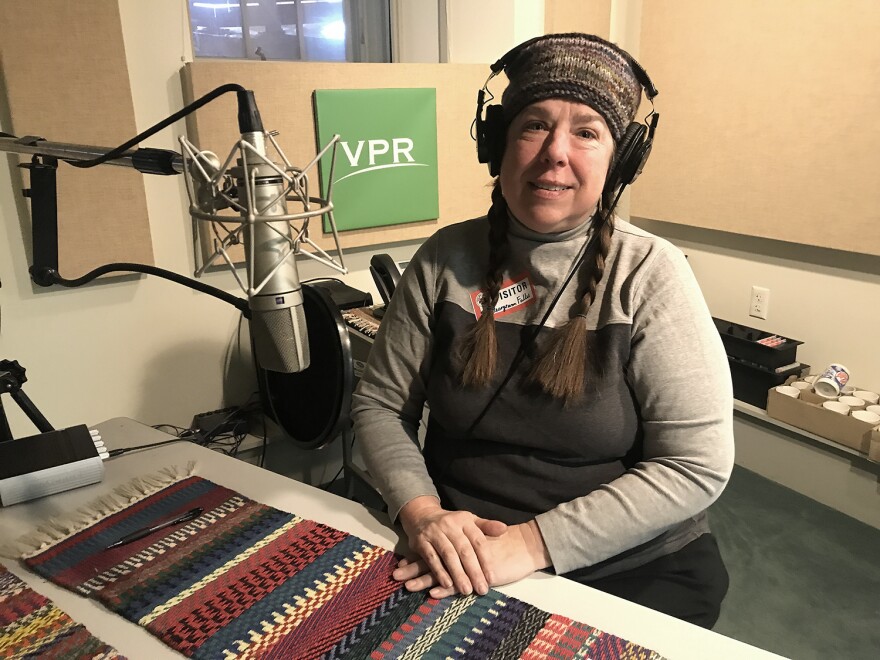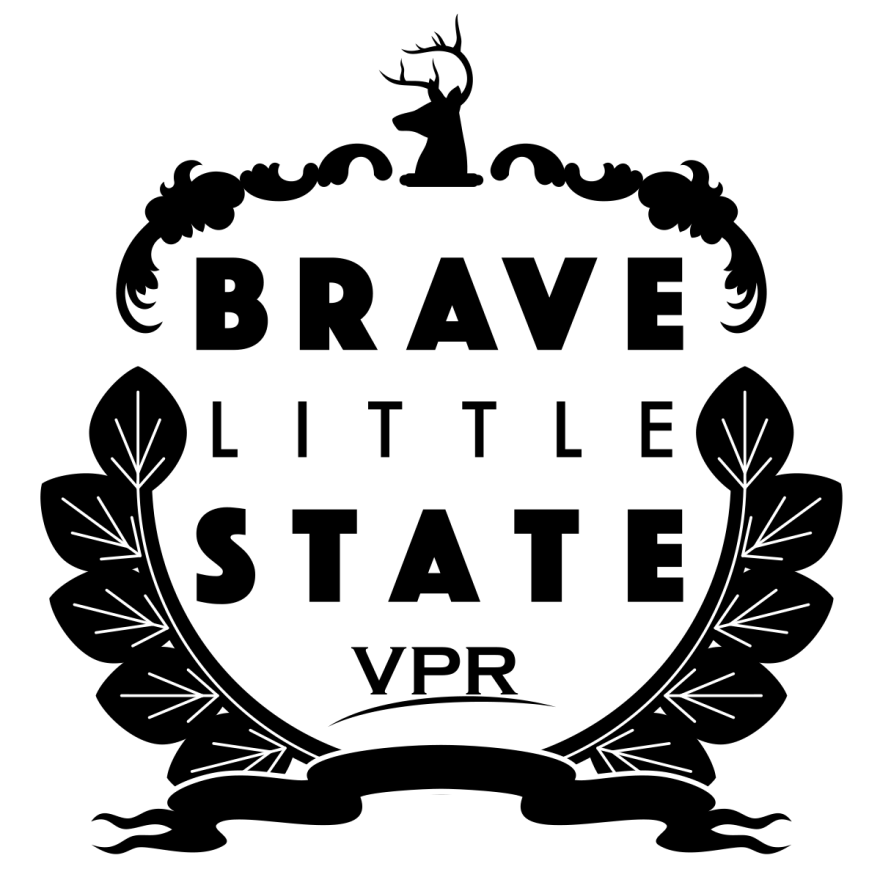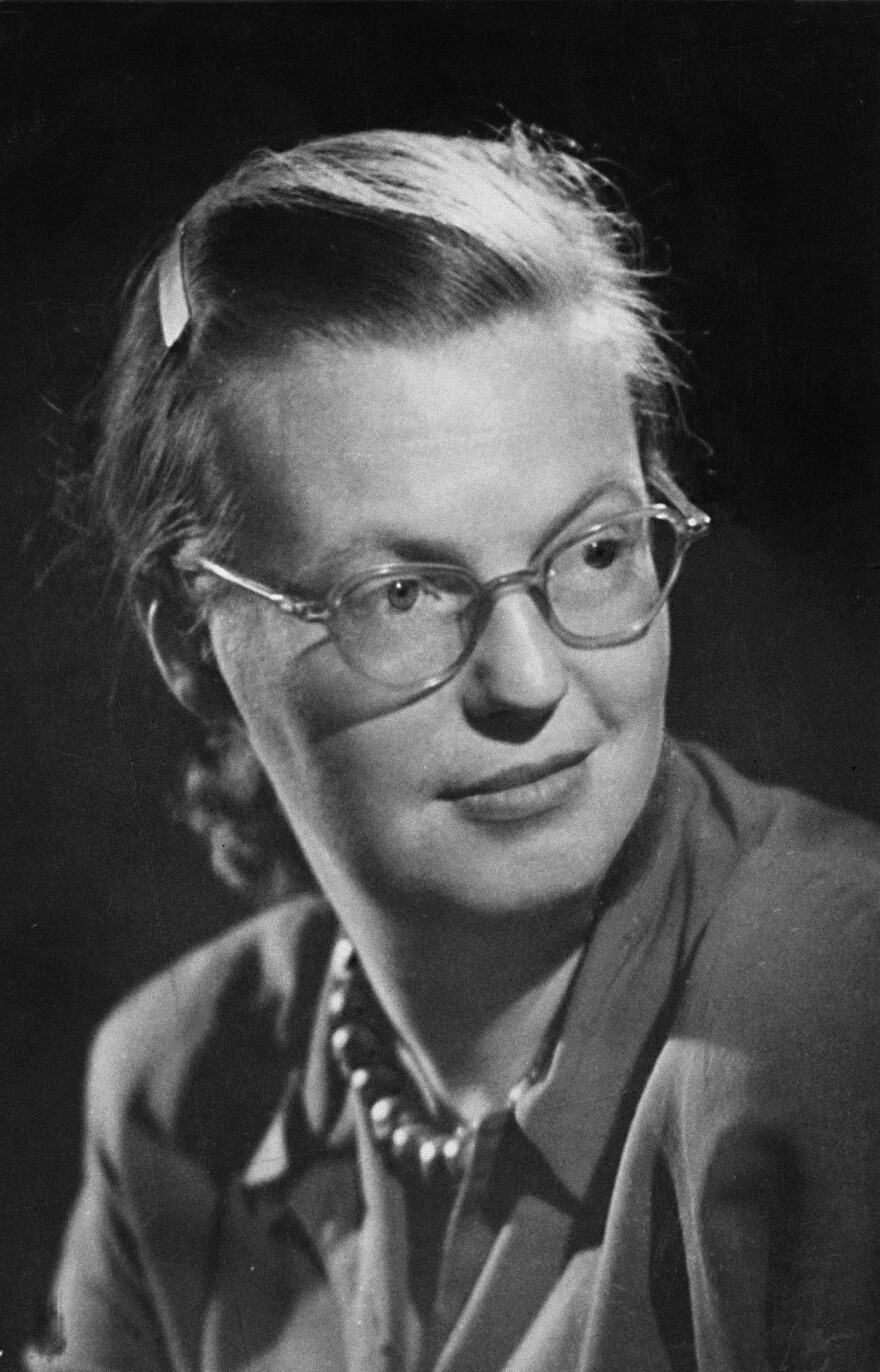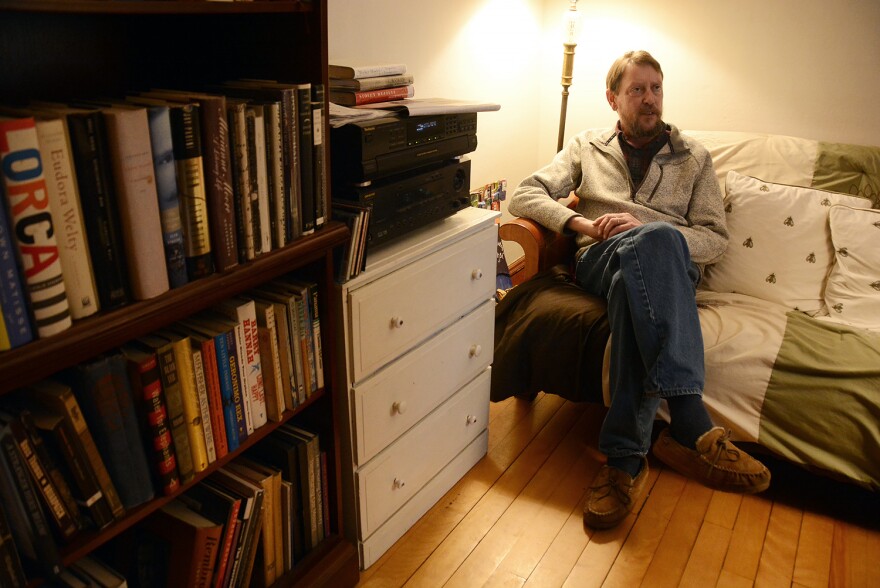This month on Brave Little State: Exploring the literary luminaries of Vermont, and why so many writers seem to thrive in the Green Mountain State.
Editor's note: Our show is made for the ear. As always, we recommend listening if you can!
A woman with a passion for reading and writing, Georgeann Faller went to Goddard College and studied education. She took writing courses as well.
"When you think of snow, you think of quiet, and you think of isolation, and being cerebral ... and you know, writing is a pretty solitary craft," she says.

Faller herself still dabbles in writing poetry from her home in Thetford.
"Yeah, I live in a broken-down hippie cabin," she says. "I’m renting this little place and nothing is level, everything rolls toward you — if you’re trying to cut on a cutting board, it’s just ridiculous. But it’s great. It’s isolated, back road, and yeah, that’s what got me thinking."
Faller's thinking is what led to the topic of this month's Brave Little State, VPR's people-powered journalism podcast: “What draws so many writers and poets to Vermont? Who are some well-known writers and poets, both past and present?”
So place a bookmark in what you're currently reading and come along as we dive into Vermont's literary landscape.
Subscribe for free, and never miss an episode:
Loading...
Taking literary inventory
Now, before we can explore why Vermont seems to be an alluring place for writers, we need to establish if it really is. So we called up Timothy Consedine, the regional economist for the U.S. Bureau of Labor Statistics' New England Information Office.

Consedine walked us through the bureau’s website to find data on particular jobs within a region — and, as it turns out, Faller was onto something.
According to Consedine, "There's actually a large concentration of writers and authors in the state relative to other states in the country. ... Across all the states and the District of Columbia, Vermont is within the top five for in terms of concentration of jobs within this category."
So, confirmed: Vermont is a small state with lots of writers. And we’re going to meet some of them — but we say some because there are far too many authors with Vermont connections to name them all in just one episode of our show.
(We apologize in advance in advance to anyone left off the list — but let us know who else you would include down in the comments. Brave Little State is powered by you, after all!)
To get at the second part of Faller's question, let's start by mentioning a few notable names from the Green Mountain State's past:

- Robert Frost lived and worked in Ripton for much of his life. His place is now a National Historic Landmark.
- Nobel Prize-winning author Sinclair Lewis lived in Barnard. He and his wife owned Twin Farms, now a luxury resort.
- Rudyard Kipling spent four years in Dummerston, where he wrote The Jungle Book and other works.
- Wallace Stegner is probably remembered as a western writer, but he spent most of his summers in the Northeast Kingdom and considered Greensboro his second home.
- Shirley Jackson published The Haunting of Hill House and We Have Always Lived in the Castle in North Bennington.
- Dorothy Parker, along with artists from the famed Algonquin Round Table, spent time on Neshobe Island in Castleton’s Lake Bomoseen.
- Galway Kinnell, winner of the National Book Award and the Pulitzer Prize for Poetry, lived in Sheffield.
A few years back, three literary giants in the Northeast Kingdom all passed away within a few months of each other:
- David Budbill’s poetry, especially his famed Judevine, was inspired by small-town life in Wolcott; posthumously Budbill was honored by the state legislature.
- Budbill died just days after the passing of Barton poet Leland Kinsey.
- Just four months later, Kinsey’s fishing buddy Howard Frank Mosher — perhaps Vermont’s most famous novelist in recent times — died at his home in Irasburg.

Still today a number of authors call Vermont home, including:
- New York Times best-selling author Chris Bohjalian lives in Lincoln.
- Archer Mayor has written his Joe Gunther detective series from his home in Newfane.
- Weybridge author Julia Alvarez got a 2013 National Medal of Arts from President Barack Obama.
The state is also home to a thriving number of children's and young adult authors:
- East Calais resident M.T. Anderson has snagged three nominations for the National Book Award (including one win).
- Katherine Paterson, author of Bridge to Terabithia, lives in Montpelier and is a two-time winner of the Newbery Medal and National Book Award.
- Will Alexander, who won a National Book Award with his first novel, teaches at the Vermont College of Fine Arts, in Montpelier.

And indulge us as we mention two current literary giants who, though they moved away later in life, spent much of their time in Vermont:
- John Irving wrote a number of books that have been turned into Hollywood films, including The Cider House Rules and The World According To Garp. He lived in Dorset for more than 20 years, and now makes his home in Toronto. Irving told us in a phone call that he is currently at work on a new novel that will likely be published in 2020.
- UVM graduate Annie Proulx lived in Vermont for three decades, including stints in the Northeast Kingdom and Vershire. She moved to Wyoming shortly after she published her Pulitzer Prize-winning novel, The Shipping News.
Plus, it seems a safe bet that there'll be other Vermont writers to become acquainted with as more join the state's ranks in the future.
Miciah Bay Gault, an instructor in the writing and publishing MFA at Vermont College of Fine Arts, is about to publish her debut novel this summer. In conversation with Brave Little State, at one point the topic turned to Proulx: "She, in interviews, praises this idea of voluntary solitude," Gault says. "The luxury of living alone and being a master of one's own time. ... I thought about that a lot, thinking about Vermont and the solitude of Vermont."
Looking for works by writers with Vermont connections? Check out our (not-at-all-comprehensive, but hey, it's a start) list on Goodreads. And share your suggestions in the comments!
But rather than just listing Vermont writers, let's actually talk to a few of them, shall we?
"Perfect freedom to do what you want to do."
Our question-asker Georgeann Faller told us about one of her favorite Vermont writers: "I would choose Kathryn Davis, because she’s such an unusual writer, and such [an] accessible and interesting person."
A little backstory: Kathryn Davis was Faller’s writing instructor at Goddard College, in Plainfield, and is currently the senior fiction writer on the faculty at Washington University in St. Louis. That’s where the teaching gig is, but Davis chooses to live most of the year in Montpelier.
“I like the winter; I think it’s pretty wonderful," Davis says. "I have absolutely no wish to leave this place."
Loading...
Davis has written eight novels. Her newest, published this year, is called The Silk Road. Fans of her work in these parts like to point out her novel The Thin Place from 2006, which puts the reader in a couple of Vermont cities and towns, albeit with some literary sleight of hand:

"The Thin Place is set in Montpelier and Calais ... although they're not named," Davis explains. "I wrote that during this brief period when we were in exile in New York state. So I could see here better from there, what it was like here. And I think I've always sort of done that. It's as if this place where I live is the very quiet empty place where my spirit gets to expand to its fullest and will invite in all sorts of other things."
Davis says Vermont is pretty, but acknowledges that isn't necessarily unique to this state. She says a big draw for her has to do with an attitude she's found here.
"I think what is most attractive to me about living in Vermont as a writer," Davis explains, "is something that characterizes Vermont and the people of Vermont, and it's that sense here — very strong sense here — that nobody's going to tell you what to do."
She notes that attitude can have its pros and cons here in Vermont, "but the feeling in the place, ever since I first moved here which was back in 1969, was freedom ... perfect freedom to do what you want to do," Davis says. "And I feel like the air is full of that here and continues to be that way."
"Privacy is pretty important for a writer, you know."
Author Jeffrey Lent, a novelist, is well-acquainted with that spirit of independence Davis referenced.
Lent lives in Randolph after many years making his home in Tunbridge. He and his wife, Marion, and two energetic English setter dogs all share space in an early 20th-century Victorian home that once housed a local medical practice. Lent is the author of six novels, his first being the 2001 New York Times best-seller In the Fall.
Books were always a part of Lent's life growing up. Lent describes his parents as early hippies who pre-dated the “Back to the Land” wave of the early 1970s by about 30 years. They went to Dartmouth to hear Robert Frost recite poetry, and kept books all over the house — but Lent was still expected to work on the farm in North Pomfret where he grew up.
"One of the things that really prepared me well for the life of a writer was growing up on a dairy farm," Lent says, "because it doesn't matter if it's Christmas or the Fourth of July or whatever, the cows still have to be milked, right? I mean ... the work has to be done. You're not going to a job, you don’t have a day off."

Lent says location is part of Vermont's allure — both in terms of proximity to other Northeast cities and the state's "pastoral" aesthetic.
"I think the strong-knit community is also really important, and I trace a lot of it to town meeting," Lent says. "But the fact that we all know each other and even though we may not really know, like, the politics of somebody — we can usually kind of guess — but there's something that transcends that that keeps us in a larger community sense. ...
"Community, and the respect of privacy. The two kind of go hand in hand which is, you know, you live and let live — you have that attitude about your neighbors and yourself and you expect it. And privacy is pretty important for a writer, you know."
Lent writes rich, dense prose that's packed with detail, the kind of writing that can make a reader feel immersed in the sights, sounds, smells of a given scene. His novel A Slant of Light contains a passage about eating a fresh-picked peach that will make you feel like the juice is dripping down your chin.
He's also a voracious reader, his writing study lined with books of poetry, fiction and nonfiction from writers past and present. But Lent defers when asked to talk about some contemporary Vermont writers he loves to read:
"Naming contemporaries is not really comfortable because then ... there's always somebody you forget and then, you know, it's like they hear the omission," Lent says. "Nobody hears the omission more than the writer who feels like they should be included, right?"
So again, we know we can't possibly name all authors with a Vermont connection in this episode — help us out by naming some of your favorite writers in the comments, or tweet us @bravestatevt to keep the conversation going.
"And I remember thinking, 'Someday I'm going to live here.'"
We've so far heard Lent speak about privacy and Davis talk about the state's beauty — and both solitude and the natural beauty of Vermont have inspired a lot of the poetry written by Major Jackson.
At his home in South Burlington, Jackson has quite a collection of books in his writing study.

"This is my guilty pleasure: I buy rare books," he explains. Jackson shows some of his most valued books, including a first-edition volume of poetry by Gwendolyn Brooks, the first African-American woman to win a Pulitzer Prize for Poetry.
Jackson is a professor of English at the University of Vermont, and he's published four volumes of poetry, including Roll Deep which won the 2016 Vermont Book Award.
Jackson’s dream of coming to Vermont began when he attended the Bread Loaf Writers' Conference in Middlebury in 1996, a place a world away from the city of Philadelphia where he grew up. Jackson worked at Bread Loaf that summer as a waiter (a coveted position for up-and-coming writers) and recalls spending free time hiking.
"One of those evenings after all the long day of poetry readings, we went skinny dipping in Lake [Pleiad] and the stars were out. And I remember thinking, 'Someday I'm going to live here.'"
"Six years later, 2002, I moved here as a result of a position opening up in the English department. I was determined to get that job," he says with a laugh. "Because I had not in the six years returned to Vermont, but the memory of it stayed with me."
WATCH: Jackson reads his poem "Enchanters of Addison County" (via RETN)
https://www.youtube.com/watch?v=TT8UG05j7Xg
Jackson, who is African-American, said moving to Vermont — one of the whitest states — was "not an issue" for him.
"I do not want to diminish the importance of race, but race is something invented by white people to keep and conquer others," Jackson says. "And while I teach the importance of culture and ethnicity, I teach the literature and art of African-Americans, I maintain connections with family and friends that does not have me have day-to-day anxieties about the fact that there's not enough Latinos, blacks and Asians in Vermont."
Our conversation wasn't the first time Jackson says he's fielded this question about race and living in Vermont.
"I get this question all the time and no offense, it feels very kind of 20th-century. I mean we live in a more global age right now. Would I welcome more black barbers in Burlington? Yes, I would," Jackson says, laughing. "However, I'm a stone's throw away from a wonderful Caribbean community in Montreal. I have Haitian friends in Boston. We're not as isolated as we once were in the 1950s, '60s and '70s."
And not only is the inquiry "kind of 20th-century," but Jackson says that, in effect, the question is misdirected:
"Particularly asking people of color or African-Americans, 'What do you think about the whiteness of Vermont?' Is it troubling? Yes, it is troubling. I've never been chased by skinheads in Vermont. I've never been called the N-word in Vermont. Even if someone thought about it, they never said it to my face," Jackson says, adding that "of course" that has happened to him elsewhere.
So while Jackson is no stranger to Vermont's shortcomings, he highlights positive aspects he's found.
"There is a level of decency around humanity and the environment and how we should treat each other," he says. "There is, for the most part, a spiritualness about the place — at least that I see and sense — that has me feel comfortable."
Loading...
"Vermont truly was what she identified as her home."
Often when we asked other writers for some of their personal favorites, one name kept resurfacing: Ruth Stone.
Ruth Stone is a former poet laureate of Vermont who won the National Book Award for poetry in 2002 and was a Pulitzer finalist in 2009. She died at her home in Ripton in 2011 after living in Goshen, Vermont, for decades in a house that’s now listed on the National Register of Historic Places. Thanks to the efforts of her heirs, an effort is underway to turn that property into a writer’s retreat.
"She moved to Vermont in the late '40s to a house in Goshen, which is a very small town near Bread Loaf. No stores or anything, and it's just in the mountains on a dirt road," says Ruth Stone's grandaughter Bianca Stone. "And that's where she raised my mom and my two aunts, and subsequently me."

Bianca Stone, who lives in Brandon, comes from a long line of writers. In addition to her grandmother, her mother, her aunt, her sister and her brother are all authors in various genres. And yes, she herself is a poet — "I also do visual art and the occasional nonfiction," Bianca Stone adds.
She describes her grandmother's poetry as having "a musical voice."
"I feel like she wrote lots of ballads earlier on. She was very good at this sort of formal poetry that was big in the '40s when she first started writing, but she was able to subvert that — whereas a lot of poets were sort of mired in the formal writing of poetry that has since pretty much died out," Bianca Stone says.
"She right away started to play with that and make it new and — while still retaining a lot of the music of formal poetry — so I think she has that old world feel, but also was very ahead of her time in her voice."
WATCH: Ruth Stone reads her poem "Curtains" (via Poetry Breaks series)
https://www.youtube.com/watch?list=PLB0uqVEuzoEd6QEVKKykzloVUJTLiGZ0I&time_continue=97&v=_Fjz0b-uVlc
Bianca Stone recalls her grandmother's connection to the Green Mountain State: "She talked about it all the time. ... Vermont truly was what she identified as her home, and she strongly identified that with her poetry."
Bianca Stone says physical space is important to poets, and Ruth Stone’s property in Goshen — which she purchased with money she won from a poetry prize — was her literal and spiritual home.
"It becomes very important where you're able to have the privacy, space, time to create your work," Bianca Stone says, "and she was looking for that and found it in Vermont when she happened upon this house for sale, went to look at it and fell in love with it, and bought it right away — even without asking my grandfather first. And it really was her writing haven."
Bianca Stone carries her grandmother’s poetry with her always: in her heart, her mind and yes, our modern age being what it is, on her phone. Before we part, she chooses one of Ruth Stone's poems to read aloud: "Spring Beauties."
Clarification 5/8/19: This post has been updated to reflect the correct name of the lake near the Bread Loaf Writers' Conference. It is Lake Pleiad, not Lake Pleiades.

Subscribe for free, and never miss an episode:
Loading...
Brave Little State is a production of Vermont Public Radio. We have support from the VPR Innovation Fund, and from VPR sustaining members. If you like this show, consider becoming one.
Special thanks this month to Bayla Metzger. Our editor is Mark Davis, our producer is Lynne McCrea and our theme music is by Ty Gibbons. Engineering support from Peter Engisch and John Billingsley, and digital support from Meg Malone. Other music in this episode was used under a Creative Commons license:
- "Feathersoft" by Blue Dot Sessions
- "Lanky" by Blue Dot Sessions
- "Tarte Tatin" by Blue Dot Sessions
- "On Early Light" by Blue Dot Sessions
- "The Summit" by Blue Dot Sessions






